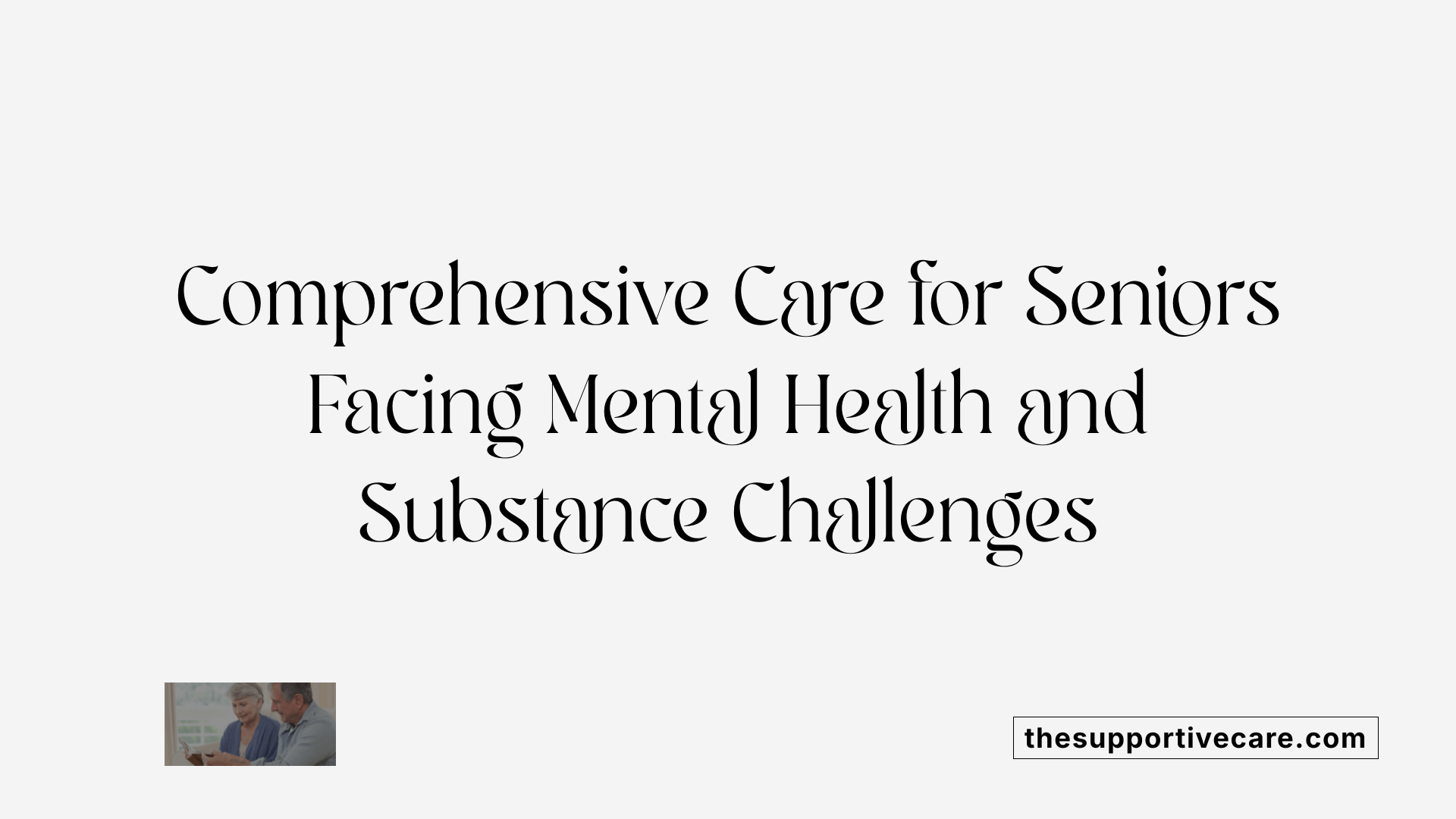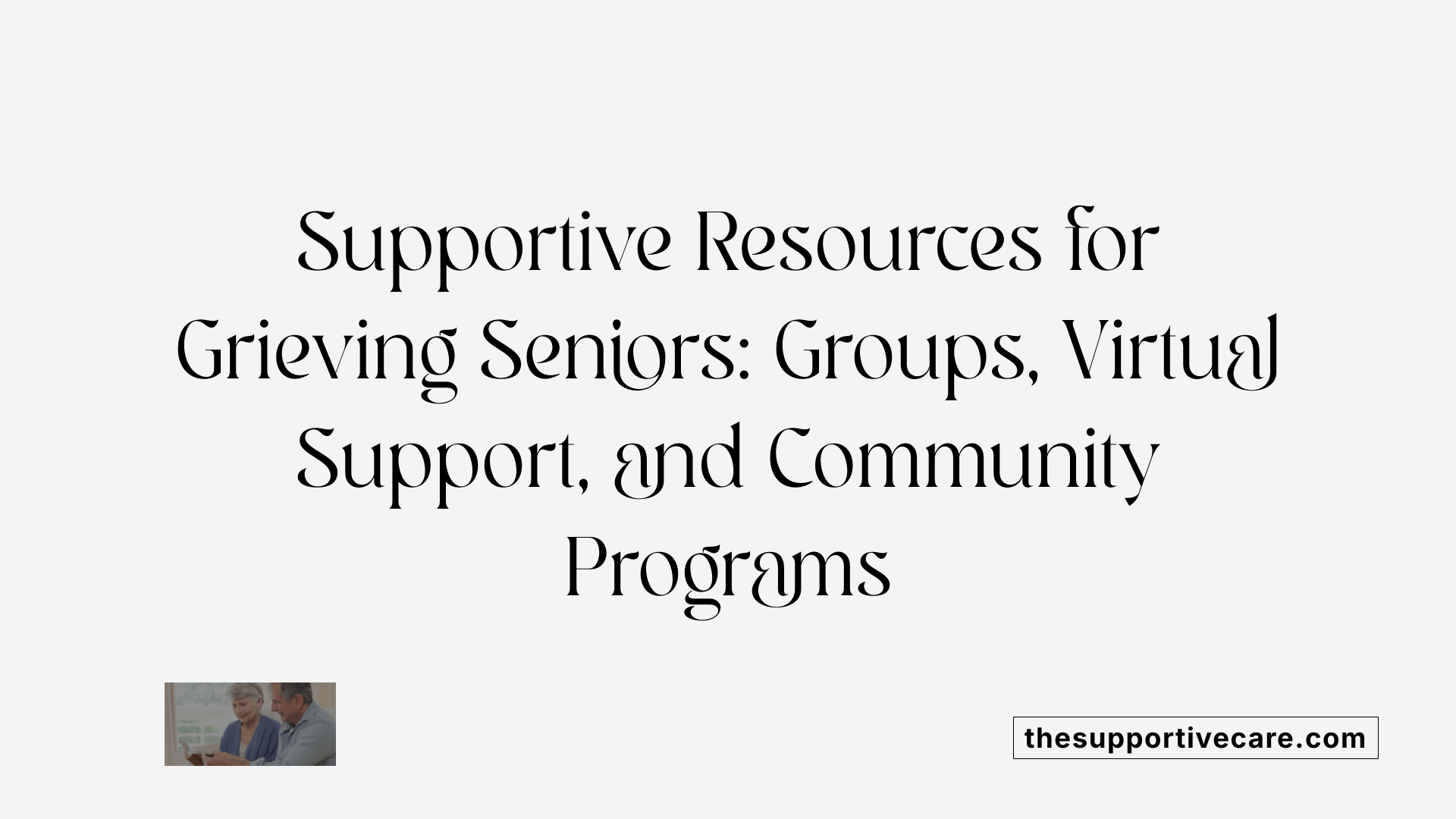Addressing the Unique Challenges of Grief in Older Adults
Grief and loss are deeply personal experiences that can have profound impacts on mental health and quality of life, particularly within senior communities. With increasing recognition of complicated grief, including conditions like Prolonged Grief Disorder, specialized grief and loss counseling tailored for older adults has become essential. This article explores the comprehensive treatment services available, integrated approaches to addiction and mental health, bereavement support initiatives, and the development of effective counseling strategies specifically designed to support senior populations through grief and loss.
Comprehensive Treatment Services for Mental Health and Substance Abuse in Seniors

What comprehensive services are available for the treatment of substance abuse and mental health issues?
Seniors facing substance abuse and mental health challenges can access a full spectrum of services tailored to their unique needs. These services start with medical detoxification to safely manage withdrawal symptoms under professional supervision. Following detox, individualized counseling and behavioral therapies—such as cognitive-behavioral therapy (CBT) and mindfulness—help address both addiction and mental health conditions.
Medication management is often integrated to reduce substance cravings and stabilize mood, especially when co-occurring mental illnesses are present. Outpatient care options provide flexibility, with both individual and group therapy sessions focused on evidence-based approaches suitable for adults aged 55 and older.
Peer involvement is an essential component, offering emotional support and shared experiences through support groups like bereavement and substance use recovery groups. These groups, often facilitated by trained peers, help reduce isolation and encourage sustained recovery.
Specialized programs, such as Personalized Recovery Oriented Services (PROS) and the STRIVE program, enhance wellness and independent living skills for seniors by integrating behavioral health with aging services. Moreover, telehealth expands access by allowing remote participation, especially important for seniors in various locations.
Altogether, this comprehensive, individualized approach—combining medical, behavioral, and psychosocial elements—provides seniors the best possible outcomes in managing mental health and substance abuse challenges.
Integrated Mental Health and Addiction Treatment: A Holistic Approach

How do treatment programs address various forms of addiction in an integrated manner?
Integrated mental health and addiction treatment programs are designed to tackle both mental health disorders and substance use issues at the same time, recognizing the complex interaction between the two. These programs use coordinated assessments to understand the full needs of each individual. Based on these assessments, care plans are customized, combining evidence-based therapies such as cognitive behavioral therapy (CBT) and motivational interviewing (MI), medication-assisted approaches, and psychosocial support.
Individualized care plans and multimodal therapies
Multimodal therapy means using a mix of treatment methods tailored specifically for each person's unique condition. For seniors, this can include outpatient cognitive behavioral therapy, mindfulness practices, and interpersonal therapy, all adjusted to address the particular challenges faced by older adults, such as managing grief or chronic conditions concurrently with addiction.
Interdisciplinary teams and coordinated assessment
A critical part of integrated care is the collaboration of interdisciplinary teams, which may include psychiatrists, social workers, addiction specialists, and counselors. This coordination ensures that treatment addresses mental health symptoms and substance use together without fragmentation. Regular monitoring helps quickly identify relapse signs and adjust care accordingly.
Benefits of integrated treatment models over separate approaches
Compared with separate treatments, integrated models offer improved clinical outcomes, better relapse prevention, and superior quality of life. For seniors, who often face stigma related to both mental illness and addiction, having a unified program reduces barriers to seeking help and supports holistic wellness, including aging in place.
Relapse prevention and stigma reduction for seniors
Programs emphasize ongoing relapse prevention strategies and stigma reduction through education and peer support. Initiatives that specifically focus on destigmatizing mental illness among older adults and teens foster safer community environments for recovery. Telehealth options further increase access to such treatments, especially in underserved areas.
These integrated approaches recognize the importance of treating the whole person, not just isolated symptoms, improving outcomes for those grappling with co-occurring mental health and substance use disorders, particularly older adults.
Specialized Grief and Bereavement Support for Older Adults

What are Bereavement and Grief in Seniors?
Bereavement refers to the period of mourning and grief following a significant loss, commonly due to death. In older adults, grief is a complex emotional response that can include sadness, anger, guilt, anxiety, and physical symptoms such as fatigue and sleep disturbances. These reactions are deeply personal and influenced by cultural and social practices.
How Do Peer-Facilitated Support Groups and Virtual Options Help?
Peer-facilitated bereavement support groups provide a compassionate space for seniors to share their experiences and find emotional support. Such groups acknowledge grief's life-shattering impact at any age and foster community bonds. Virtual options further increase accessibility, allowing seniors in diverse locations to participate in grief counseling and peer support without mobility barriers.
What is the Role of Personalized Recovery Oriented Services (PROS)?
PROS programs specifically address older adults with serious mental illness by focusing on independent living skills alongside emotional coping strategies for grief and loss. This personalized care integrates evidence-based therapies like cognitive behavioral therapy and mindfulness, tailored to the unique needs of seniors.
How Does STRIVE Promote Wellness and Aging in Place?
The STRIVE program emphasizes holistic health by merging behavioral healthcare with aging services. It supports seniors in maintaining mental health, managing substance use, and sustaining independence within their communities — key factors in healthy aging and grief recovery.
What Has Been the Impact of COVID-19 on Grief Among Seniors?
The pandemic significantly intensified grief experiences for older adults by increasing mortality rates and disrupting traditional mourning rituals. Social isolation further complicated grief processing, raising the risk for prolonged grief disorder (PGD) in this vulnerable population.
| Support Feature | Description | Benefits for Older Adults |
|---|---|---|
| Peer-Facilitated Groups | Group sessions led by individuals with lived experience | Emotional connection, reduced isolation |
| Virtual Support Options | Online counseling and support groups | Accessibility, convenience, increased participation |
| PROS Programs | Tailored mental health services for serious illnesses | Focus on independent living and emotional coping |
| STRIVE Program | Integration of behavioral health with aging services | Promotes wellness, substance use management, aging in place |
| COVID-19 Impact Awareness | Recognition of pandemic-related grief challenges | Informs specialized interventions and risk identification |
Understanding Prolonged Grief Disorder and Its Impact on Seniors

What is Prolonged Grief Disorder (PGD) and How is It Diagnosed?
Prolonged Grief Disorder (PGD), recognized in the DSM-5-TR (code F43.81) and ICD-11, is characterized by intense, persistent grief and yearning that last beyond cultural or social norms—over one year in adults. It significantly impairs daily functioning, distinguishing it from normal grief. Symptoms include persistent longing, emotional pain, difficulty accepting the loss, and pervasive preoccupation with the deceased.
Why Are Older Adults More Vulnerable to PGD?
Older adults carry a higher risk for PGD due to the multiple losses they may endure over their lifetime, such as the death of spouses, children, or close friends. Approximately 10% of bereaved adults are at risk, but the rate is notably higher among seniors. The COVID-19 pandemic worsened this vulnerability by increasing mortality rates and imposing social isolation, disrupting traditional grieving processes.
How Does Grief Affect Emotional and Physical Health?
Grief manifests through a wide range of emotional responses including sadness, anger, guilt, numbness, and anxiety. Physically, it can cause fatigue, sleep disturbances, loss of appetite, weakened immune function, and even conditions like broken heart syndrome. Complicated grief or PGD intensifies these symptoms, causing prolonged impairment in mental health and social functioning.
What Tools and Treatments Help Identify and Manage PGD?
Screening tools such as the Inventory of Complicated Grief-Revised (ICG-R) and PG-13 help identify PGD, though more development is underway. Cognitive Behavioral Therapy (CBT), Meaning-Centered Grief Therapy (MCGT), and Complicated Grief Treatment (CGT) are shown to be effective psychological approaches. Medications like antidepressants are less favored, especially for seniors, due to mixed evidence of benefit and side effects.
How Has COVID-19 Affected Grief and Mental Health in Older Adults?
The pandemic has led to a rise in grief-related mental health challenges among seniors, including death anxiety and disenfranchised grief, by amplifying loss and limiting social support. This has heightened the urgency to develop better mental health care frameworks and culturally sensitive treatment approaches tailored to this population.
| Aspect | Details | Impact on Seniors |
|---|---|---|
| Definition | PGD: persistent, intense longing >1 year; DSM-5-TR, ICD-11 | Diagnosed clinically; distinguishes complicated grief |
| Risk Factors | Multiple lifetime losses, COVID-19 pandemic effects | Elevated prevalence; worsened grief experience |
| Symptoms | Emotional (sadness, guilt), Physical (fatigue, insomnia) | Prolonged emotional distress, functional impairment |
| Screening Tools | ICG-R, PG-13 | Aid early detection and intervention |
| Treatments | CBT, MCGT, CGT; limited meds | Psychotherapy preferred; meds cautiously used |
| COVID-19 Impact | Increased death, isolation, disrupted mourning rituals | Amplifies grief intensity and mental health needs |
Therapeutic Approaches and Counseling Techniques for Grief in Senior Communities
What therapies are effective for grief in older adults?
Cognitive Behavioral Therapy (CBT) is widely recognized as an effective treatment for grief in seniors, helping individuals reframe maladaptive thoughts and build coping strategies. Specialized therapies like Meaning-Centered Grief Therapy (MCGT) and Complicated Grief Treatment (CGT) specifically address prolonged or complicated grief symptoms, offering targeted support.
How do grief counseling and grief therapy differ?
Grief counseling generally provides emotional support and coping strategies tailored to individual needs, emphasizing a non-judgmental approach. It helps individuals navigate the natural grieving process. In contrast, grief therapy is more intensive and suited for those experiencing prolonged or complicated grief, delivered by licensed mental health professionals through structured therapeutic interventions.
What counseling approaches support individualized and compassionate care?
Counseling incorporates empathy and respects the non-linear nature of grief, ensuring care is non-judgmental and customized. Counselors encourage healthy coping mechanisms such as journaling, relaxation techniques, exercise, and maintaining bonds with loved ones, supporting emotional expression and resilience.
How do community clinics and telehealth improve access to grief support?
Community health clinics, like CarePlus New Jersey, provide in-person and virtual grief counseling and support groups, expanding accessibility. Telehealth options enable seniors in diverse geographical locations to receive tailored outpatient care, including cognitive behavioral therapy, fostering continuity in mental health support.
How are artistic, cultural, and spiritual practices incorporated?
Alongside therapy, engagement in cultural or religious rituals and artistic or physical activities plays an important role in grief recovery. These supports honor individual beliefs, aid emotional processing, and strengthen community connections, complementing formal therapeutic approaches for comprehensive care.
Community Resources and Crisis Support for Grieving Seniors
Bereavement Support Groups and Virtual Memorials
Grieving seniors can find comfort through various bereavement support groups facilitated by peers who understand the complexities of loss at any age. These groups offer a non-judgmental space for emotional support. For example, programs like the Philly HEALs provide online peer support groups and individual counseling specifically for those grieving substance use-related losses. The "Always Beside Us" virtual memorial also honors individuals lost to overdose, helping to foster community remembrance and connection.
Crisis Intervention Helplines and Emergency Contacts
Immediate help is vital for seniors facing overwhelming grief or crisis. National crisis intervention services such as the National Suicide Prevention Lifeline, Crisis Text Line, and mobile crisis intervention teams offer 24/7 support. These resources provide critical assistance during emergencies, ensuring seniors have access to mental health crisis intervention when needed.
Collaboration Among Nonprofits for Grief, Mental Health, and Addiction Support
A network of nonprofits collaborates extensively to address grief alongside mental health and addiction. This cooperation broadens access to diverse programs, including outpatient mental health services, addiction treatment, and grief counseling tailored for seniors. These partnerships enhance comprehensive care and support for those coping with loss.
Stigma Reduction Initiatives and Public Awareness Campaigns
To confront the stigma surrounding mental illness and grief, especially among seniors and teens, organizations run peer-led initiatives such as 'Teens Destigmatizing Mental Illness.' These campaigns raise awareness, encourage open conversations, and foster acceptance, ensuring individuals feel supported in seeking help.
National Grief Awareness Week and Its Role
Observed annually in early December, National Grief Awareness Week highlights grief's impact and promotes support for complicated grief conditions. This week increases public education, reduces stigma, and encourages the development of enhanced care services, underscoring the importance of addressing grief with sensitivity and informed support.
A Path Forward: Strengthening Grief and Mental Health Support for Seniors
Supporting grief and loss counseling in senior communities requires an integrated, compassionate approach that acknowledges the complexity of aging, mental health, and addiction. By combining evidence-based treatments, specialized grief services, and community-driven resources, we can better address the multifaceted needs of older adults navigating profound loss. Recognition of conditions like Prolonged Grief Disorder and expansion of accessible counseling—augmented by telehealth and peer support—are vital. Continual collaboration among mental health professionals, caregivers, and organizations will advance effective interventions, reduce stigma, and promote resilience. Through these efforts, senior individuals can find hope, healing, and meaningful connections as they journey through grief toward recovery and wellness.



































































































